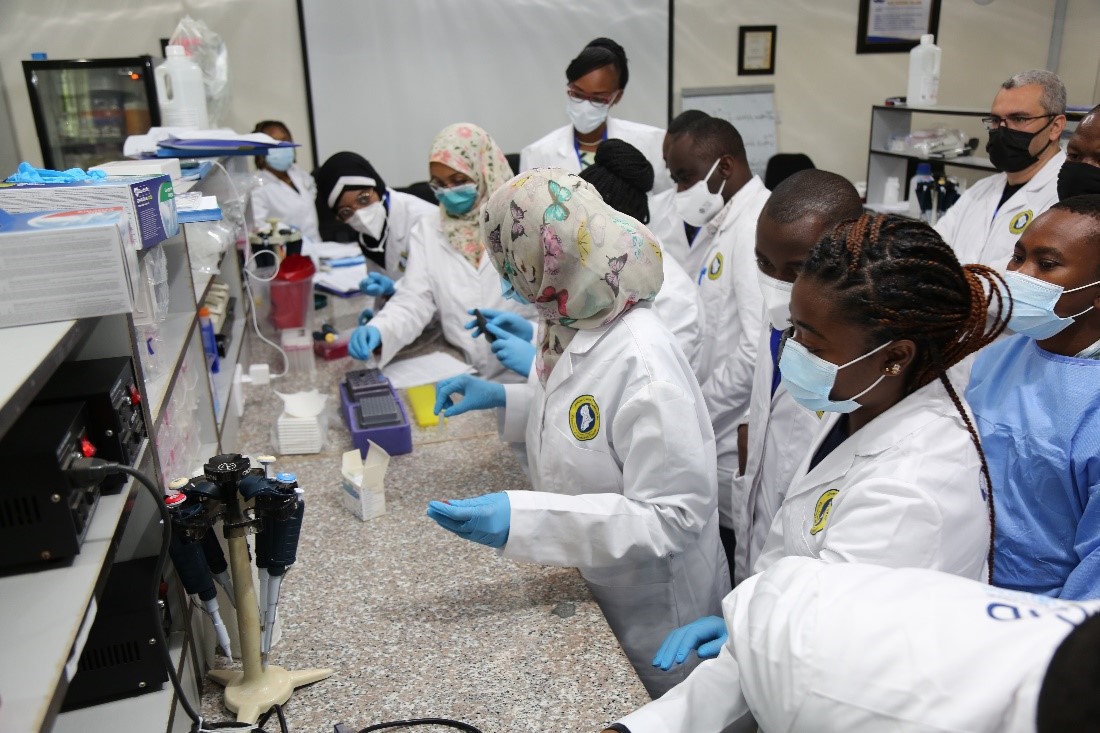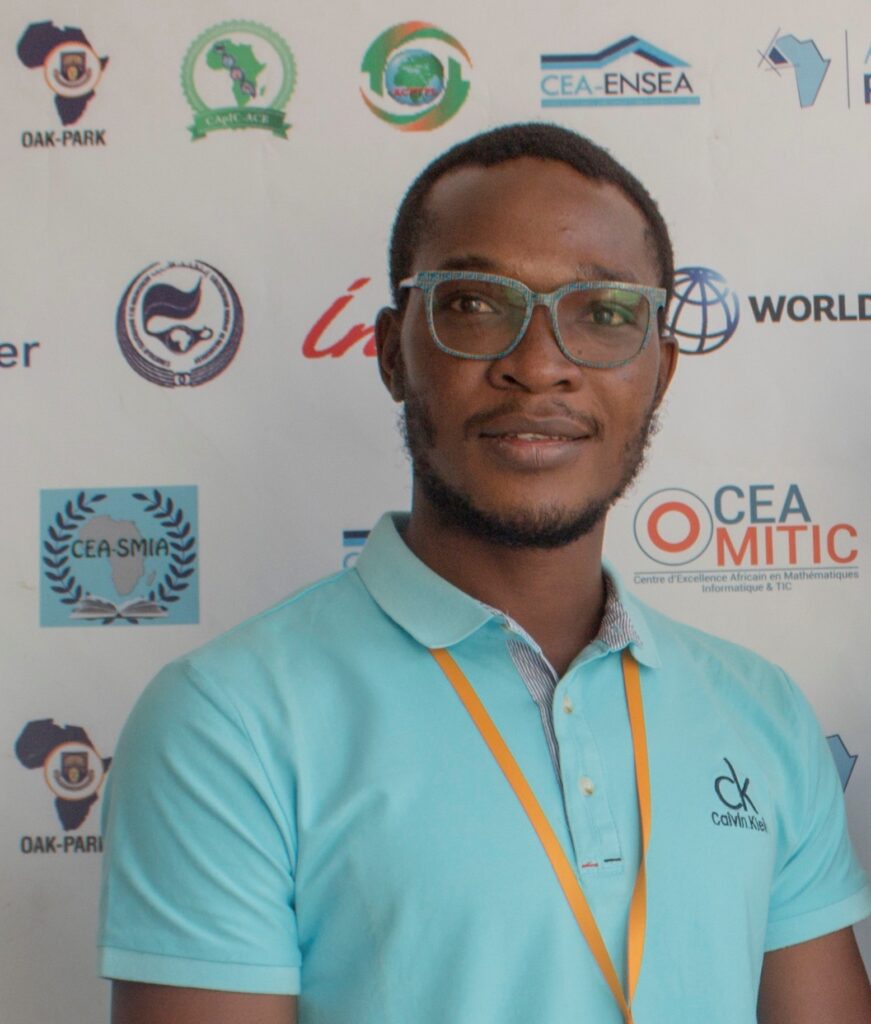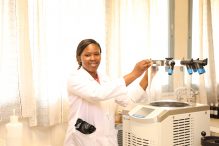In her opening remarks at the ACE 1 and ACE IMPACT Regional Workshop in Dakar on the 24th September 2019, Mrs. Himdat Bayusuf, Task Team Leader of the Africa Centers of Excellence (ACE1), stated that the “The ACE project has delivered on its promise with excellent results on the ground. The ACE project has succeeded is expanding post graduate education with at least 2000 PhD and 11000 MSc students enrolled in key priority sectors such as infectious diseases, maternal health, neglected tropical diseases, dry land agriculture, food security, water, climate change, sustainable mining, climate change, statistics; information and communication technology, materials science and engineering, just to name a few. Just as importantly, at least 30 percent of these students are females, signaling the importance of increasing female representation within the scientific fields and 30 percent of the students are from other countries within the region, highlighting the success in addressing regional higher education delivery. ACE has pushed the boundaries in terms of quality and relevance with at least 60 programs achieving international accreditation , up from a baseline of 3 at the start of the project. The ACEs have also shown the relevance of the science with centers achieving leveraging over $50 million from global competitive research grants and consultancies for their applied research work, clearly signaling the quality and relevance of the research topics being undertaken. Finally, we are proud to note that students at many of the ACEs will now benefit from state of the art labs, smart classrooms and new teaching and research equipment and resources.”
Madame Sophie Naudeau the Head of the Human Development Program in the Senegal World Bank office also added that the “ACE 1 project had kept its promise”. Madame Naudeau said that since its creation ACE 1 had improved regional integration, supported dynamic African Higher Education Institutions, achieved quality international standards, stimulated resource mobilization, promoted dynamism, innovation and progress for the African continent’s Higher Education sector.
The Africa Higher Education Centers of Excellence (ACE) project is a results-based initiative of the World Bank being implemented in partnership with selected African governments to improve the quality of African Higher Education. The financing of the project is through a grant from the International Development Association – which are soft loans competitively provided to African countries whose universities meet the stringent criteria for selection. This ACE phase 1 project was launched in 2014 and focuses on 22 centres in 8 west and central African countries. Since then ACE phase 2 was launched for east and southern African countries – managed by the Inter-University Council of East Africa. This year phase 3 of the project (referred to as ACE IMPACT) was launched in Djibouti to include more countries in western and central Africa. The Association of African Universities is the regional facilitating Unit for both ACE 1 and ACE IMPACT. The role of the AAU is to support and monitor the implementation of the ACE 1 and ACE IMPACT projects in collaboration with the World Bank, the participating governments and universities. Earlier this year the French Development Agency (AFD) has joined the World Bank to provide funding to selected centres of Excellence under the ACE IMPACT Project.
When the ACE 1 project was conceptualized, the African Higher Education experts and partners agreed that ‘a regional approach to higher education in Africa’ offered the best way to build and sustain excellence. The argument was that a regional approach enabled ‘focusing on a few dynamic institutions with pockets of quality faculty that had already been responding innovatively by offering quality, fee-based, courses to students across west and central Africa’.
What was the promise of ACE 1?
In 2014 when the ACE 1 project was launched it promised to enhance regional specialization among participating west and central African universities in the areas that address regional challenges and strengthen the capacities of these universities to deliver quality training and applied research.
The ACE 1 project also promised to strengthen post-graduate programs for a regional student body; offer specialized courses for industry professionals in the region; establish a regional faculty body; improve faculty and attract additional top level faculty; provide learning resources, labs and minor rehabilitations of existing facilities; establish linkages with companies, government agencies and research centers for work-place learning input into the curricula, consultancies and joint research and collaborate with partner institutions to share the benefits of the investments, for example through training of faculty, sharing of curricula and sharing of learning resources.
The high-level impact promised by the project was to meet the labour market demands for skills within specific areas where there are skill shortages affecting development, economic growth and poverty reduction.
Key indicators have been tracked since 2014 to measure progress towards achieving the Project Development Objective. These include:
- Number of national and regional students enrolled in new specialized short-term courses, and Master and PhD programs – to measure strengthened capacities
- Number of regional students enrolled in new specialized short-term courses, and Master and PhD programs – to track regionality
- Number of internationally accredited education programs – to track the quality of the training programmes
- Number of students and faculty with at least 1-month internship in companies or institutions relevant to their field – to track training quality and address challenges
- Amount of externally generated revenue by the ACEs – to track training and research quality
Evidence that the ACE 1 Project has kept its promise
During the September meeting in Dakar Mrs Adeline Addy, the Monitoring, Evaluation and Learning Officer from the Association of African Universities secretariat reported that there was a positive outlook on performance & grant disbursements as the ACE 1 project approaches closure in March 2020. Sixteen centres of excellence have earned above 80% of their total grants – the target being that by March 2020 all the grant funds would be fully disbursed. Four out of five project development objectives have been achieved and these are 30,259 total number of students trained; 12,062 number of regional students trained; 212 number of accredited programs and US$50,636,317 total external revenue mobilised by the participating centres.
Undoubtedly, the 22 ACE 1 centres have enhanced regional specialization in west and central Africa in the areas of agriculture, health, science, technology, engineering and mathematics to address regional challenges. These centres have been strengthened as regional centres in a diversity of fields of specialization that include, but are not limited to, genomics of infectious diseases, mines and environment, information and communication technology, poultry science, cell biology, materials science and climate science.
The capacities of the participating universities have been strengthened to deliver quality applied research – the evidence to support this is that on average, 25% of ACE publications are within the highest Cite Score percentile, indicating the high quality of the publications.
The capacities of the participating universities have also been strengthened to deliver quality training – this is evidenced by the fact that 57 internationally accredited programmes have been registered among the participating centres of excellence. In addition, 155 programmes have been accredited at either national or regional levels.
The reported number of 30,259 trained across the 8 participating west and central Africa countries leads us to infer that the ACE 1 project has significantly contributed towards the west and central Africa labour market demands for skills within specific areas where there were skill shortages affecting development and economic growth.
A pilot graduate students’ tracer study was recently conducted, and it received responses from 9 ACE 1 and 4 ACE 2 centres. The results further allude to the positive impact of the ACE initiative. The study focused on graduates’ satisfaction, relevance of the ACE programs and employability of the ACE graduates. The findings revealed that 96% of the respondents were satisfied with the quality of ACE teaching & learning. 88% were satisfied with the relevance and adequacy of internships programs. Concerning the relevance of the ACE programs, 98 % of the respondents indicated that the ACE programmes were relevant to labour market demands and 83% said that they would recommend ACE programs. Concerning employment, it was heartening to note that there was a 74% employment rate for ACE Graduates – with 46% ACE Graduates in full-time or related employment. 78% respondents said that they were satisfied with their jobs.
Conclusion
Even though more still needs to be done to support the strengthening of higher education institutions in west and central Africa – the ACE 1 project has meaningfully contributed towards responding to several challenges that were identified 2014.
Higher education in West and Central Africa was previously found to be under-developed and had been a low priority for the past two decades. Through the ACE 1 project, 8 countries have demonstrated their re-commitment to developing their higher education institutions.
The countries faced a shortage of human resources and capacity within Science, Technology, Engineering, and Mathematics (STEM) as well as agriculture and health disciplines. The ACE 1 project has strengthened specializations in the areas of agriculture, health and STEM, with 30,259 trained in these priority areas.
There were limited investments in higher education – and this meant that higher education institutions in west and central Africa were not capable of responding to the immediate skills needs or supporting sustained productivity-led growth in the medium term. The ACE 1 project has led to total investments of over USD250 million into the west and central Africa higher education sector.
Higher education in west and central Africa (and Africa as a whole) faced severe constraints in terms of attaining a critical mass of quality faculty. The ACE 1 project has facilitated the training of 3,583 faculty and 30,256 MSc and PhD students as well as delivering short courses.
A key lesson is on the importance of devising means of sustaining the financing for higher education through engagement of development partners, the private sector and governments. Governance and leadership have proved to be integral to the development of higher education systems that respond to the needs of the west and central African economies.



 He noted that “Food fraud has become an evolving challenge in the Nigerian health system that has led to the deaths of many people, especially the vulnerable groups that include mostly children, the elderly, and immune-compromised persons. Although food and health researchers, as well as regulatory bodies, have implemented a wide range of instrumental techniques such as chromatography, mass spectrometry, among others to monitor food fraud and authenticity, food fraud is still ongoing in diverse localities because the wide gap between the lab, consumer and the market is unabridged.” Therefore, as part of his study, Garjila seeks to provide innovative techniques in detecting and mitigating food fraud.
He noted that “Food fraud has become an evolving challenge in the Nigerian health system that has led to the deaths of many people, especially the vulnerable groups that include mostly children, the elderly, and immune-compromised persons. Although food and health researchers, as well as regulatory bodies, have implemented a wide range of instrumental techniques such as chromatography, mass spectrometry, among others to monitor food fraud and authenticity, food fraud is still ongoing in diverse localities because the wide gap between the lab, consumer and the market is unabridged.” Therefore, as part of his study, Garjila seeks to provide innovative techniques in detecting and mitigating food fraud.


